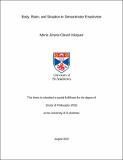Files in this item
Body, brain, and situation in sensorimotor enactivism
Item metadata
| dc.contributor.advisor | Wheeler, Michael | |
| dc.contributor.author | Clavel Vázquez, María Jimena | |
| dc.coverage.spatial | x, 219 p. | en_US |
| dc.date.accessioned | 2021-02-22T12:48:51Z | |
| dc.date.available | 2021-02-22T12:48:51Z | |
| dc.date.issued | 2020-12-02 | |
| dc.identifier.uri | https://hdl.handle.net/10023/21473 | |
| dc.description.abstract | This thesis tackles issues that arise around Sensorimotor Enactivism’s (SMEn) conception of embodiment. SMEn is a theory that claims that perception is something perceivers do, that requires the possession and execution of practical knowledge about the way sensory information changes after an interaction. One of the key commitments of this view is to the idea that this knowledge—sensorimotor knowledge—depends on details of the body of the perceiver. The thesis is divided in four parts, each addressing different challenges. Part I sets the stage for the problems that are discussed in the rest of the thesis. I examine SMEn’s claims that perception is active and knowledgeable, as well as its position regarding representations and externalism. In Part II, I discuss the concern that SMEn is chauvinistic in that it claims that only creatures with bodies like ours can have experiences like ours. I argue that SMEn cannot be said to be chauvinistic because, even if its embodiment claim involves a commitment to an irreducibly perspectival aspect of perceptual experience, Sensorimotor Contingencies (SMCs) are structural descriptions of perceptual systems that already involve information about objects’ invariant features. In Part III, I defend a predictive approach to SMEn to address the concern that, while it claims that perception is embodied, it leaves out one crucial element of the material basis of perceptual experience: the brain. Although the predictive framework is standardly taken to involve a representational and internalist profile, I argue in favour of the compatibility between SMEn and the Free Energy Approach (FEA). Part IV addresses a concern that is based on the phenomenological analysis of the body, according to which the body is marked by someone’s social and historical circumstances. I argue that the predictive version of SMEn makes plausible the idea that perceptual experience is social all the way down. | en_US |
| dc.description.sponsorship | "This work was supported by Mexico’s National Council of Science and Technology (Consejo Nacional de Ciencia y Tecnología, CONACYT) under PhD scholarship 295962/440722; by a SASP (St Andrews and Stirling Philosophy Graduate Programme) Maintenance Studentship; and by Mexico’s Secretariat of Education (SEP, Secretaría de Educación Pública)." -- Funding | en |
| dc.language.iso | en | en_US |
| dc.publisher | University of St Andrews | |
| dc.relation | Clavel Vázquez, M. J. (2019). A match made in heaven: predictive approaches to (an unorthodox) sensorimotor enactivism. Phenomenology and the Cognitive Sciences, 653–684. https://doi.org/10.1007/s11097-019-09647-0. [http://hdl.handle.net/10023/19204] | en_US |
| dc.relation.uri | http://hdl.handle.net/10023/19204 | |
| dc.rights | Creative Commons Attribution-NonCommercial-NoDerivatives 4.0 International | * |
| dc.rights.uri | http://creativecommons.org/licenses/by-nc-nd/4.0/ | * |
| dc.subject | Sensorimotor enactivism | en_US |
| dc.subject | Predictive processing | en_US |
| dc.subject | Perception | en_US |
| dc.subject | Perceptual experience | en_US |
| dc.subject | Embodied cognition | en_US |
| dc.subject.lcc | B828.45C6 | |
| dc.subject.lcsh | Philosophy of mind | en |
| dc.subject.lcsh | Perception | en |
| dc.title | Body, brain, and situation in sensorimotor enactivism | en_US |
| dc.type | Thesis | en_US |
| dc.contributor.sponsor | Consejo Nacional de Ciencia y Tecnología (CONACyT) (Mexico) | en_US |
| dc.contributor.sponsor | St Andrews and Stirling Graduate Programme in Philosophy (SASP) | en_US |
| dc.contributor.sponsor | Mexico. Secretaría de Educación Pública | en_US |
| dc.type.qualificationlevel | Doctoral | en_US |
| dc.type.qualificationname | PhD Doctor of Philosophy | en_US |
| dc.publisher.institution | The University of St Andrews | en_US |
| dc.publisher.department | University of Stirling | en_US |
| dc.identifier.doi | https://doi.org/10.17630/sta/26 | |
| dc.identifier.grantnumber | 295962/440722 | en_US |
The following licence files are associated with this item:
This item appears in the following Collection(s)
Except where otherwise noted within the work, this item's licence for re-use is described as Creative Commons Attribution-NonCommercial-NoDerivatives 4.0 International
Items in the St Andrews Research Repository are protected by copyright, with all rights reserved, unless otherwise indicated.


